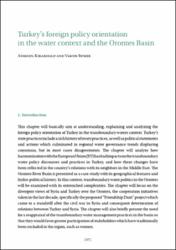Please use this identifier to cite or link to this item:
https://hdl.handle.net/20.500.11779/261Full metadata record
| DC Field | Value | Language |
|---|---|---|
| dc.contributor.author | Kibaroğlu, Ayşegül | - |
| dc.contributor.author | Sümer, Vakur | - |
| dc.date.accessioned | 2019-02-13T21:38:32Z | |
| dc.date.available | 2019-02-13T21:38:32Z | |
| dc.date.issued | 2015 | - |
| dc.identifier.citation | Kibaroglu A., & Sumer, V. (2015) “Turkey’s foreign policy orientation in the water context and the Orontes basin,” In: R. Ballabio, F.G. Comair, M. Scalet, M. Scoullos (eds.) Science diplomacy and trans-boundary water management. The Orontes River case,” UNESCO, Venice, Italy, ISBN: 9789230000172 | en_US |
| dc.identifier.isbn | 9.79E+17 | - |
| dc.identifier.uri | https://hdl.handle.net/20.500.11779/261 | - |
| dc.identifier.uri | https://unesdoc.unesco.org/ark:/48223/pf0000233031 | - |
| dc.description.abstract | This chapter will basically aim at understanding, explaining and analyzing the foreign policy orientation of Turkey in the transboundary waters context. Turkey’s state practices include a rich history of treaty practices, as well as political statements and actions which culminated in regional water governance trends displaying consensus, but in most cases disagreements. The chapter will analyze how harmonizationwiththeEuropeanUnion(EU)hashadimpactsonthetransboundary water policy discourses and practices in Turkey, and how these changes have been reflected in the country’s relations with its neighbors in the Middle East. The Orontes River Basin is presented as a case-study with its geographical features and hydro-political history. In this context, transboundary water politics in the Orontes will be examined with its entrenched complexities. The chapter will focus on the divergent views of Syria and Turkey over the Orontes, the cooperation initiatives taken in the last decade, specifically the proposed “Friendship Dam” project which came to a standstill after the civil war in Syria and consequent deterioration of relations between Turkey and Syria. The chapter will also briefly present the need for a reappraisal of the transboundary water management practices in the basin so that they would favor greater participation of stakeholders which have traditionally been excluded in the region, such as women. | en_US |
| dc.language.iso | en | en_US |
| dc.publisher | UNESCO | en_US |
| dc.relation.ispartof | Science diplomacy and transboundary water management The Orontes River case | en_US |
| dc.rights | info:eu-repo/semantics/openAccess | en_US |
| dc.subject | Science Diplomacy | en_US |
| dc.subject | Water Management | en_US |
| dc.title | Turkey’s Foreign Policy Orientation in the Water Context and the Orontes Basin | en_US |
| dc.type | Book Part | en_US |
| dc.authorid | Ayşegül Kibaroğlu / 10600 | - |
| dc.authorid | Ayşegül Kibaroğlu / I-9007-2016 | - |
| dc.authorid | Ayşegül Kibaroğlu / 0000-0002-9648-5975 | - |
| dc.relation.publicationcategory | Kitap Bölümü - Uluslararası | en_US |
| dc.identifier.endpage | 78 | en_US |
| dc.identifier.startpage | 57 | en_US |
| dc.department | İİSBF, Siyaset Bilimi ve Uluslararası İlişkiler Bölümü | en_US |
| dc.institutionauthor | Kibaroğlu, Ayşegül | - |
| item.grantfulltext | open | - |
| item.fulltext | With Fulltext | - |
| item.languageiso639-1 | en | - |
| item.openairetype | Book Part | - |
| item.openairecristype | http://purl.org/coar/resource_type/c_18cf | - |
| item.cerifentitytype | Publications | - |
| crisitem.author.dept | 04.04. Department of Political Science and International Relations | - |
| Appears in Collections: | Siyaset Bilimi ve Uluslararası İlişkiler Bölümü Koleksiyonu | |
Files in This Item:
| File | Description | Size | Format | |
|---|---|---|---|---|
| Turkeys foreign policy orientation in the water context and the Orontes Basin.pdf | Yayıncı Sürümü_Kitap Bölümü | 159.89 kB | Adobe PDF |  View/Open |
CORE Recommender
Page view(s)
64
checked on Nov 18, 2024
Download(s)
6
checked on Nov 18, 2024
Google ScholarTM
Check
Altmetric
Items in GCRIS Repository are protected by copyright, with all rights reserved, unless otherwise indicated.